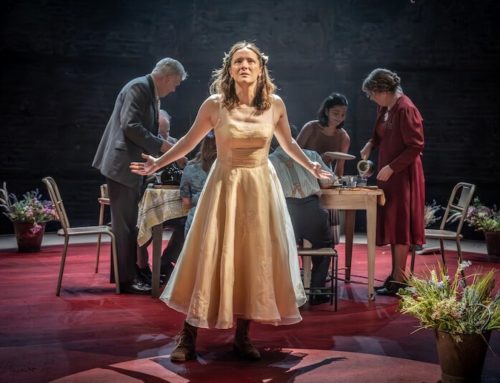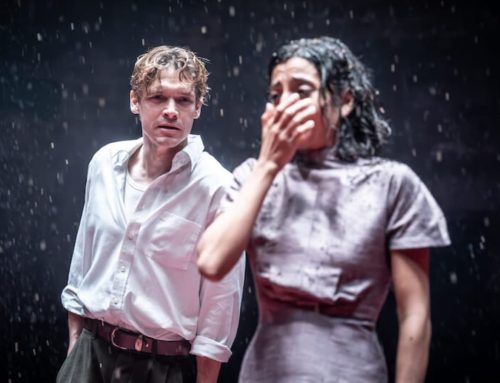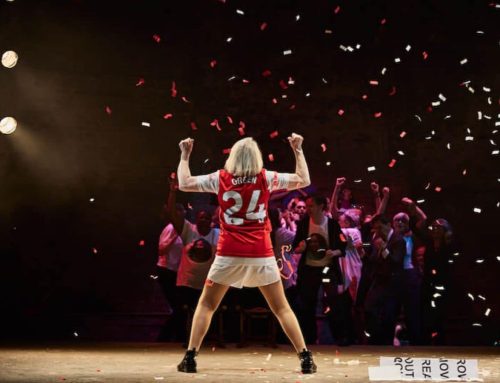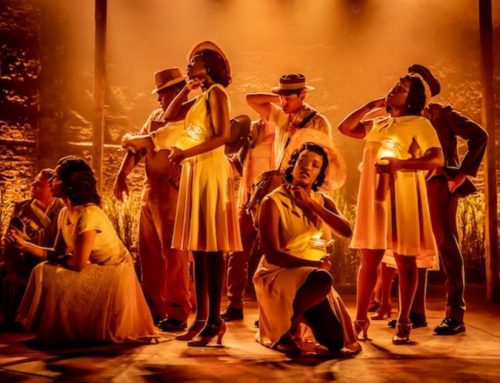‘Jeremy O’Harris’ excellent tragicomedy, ‘Daddy’, is an ambitiously audacious, extraordinary, and thoroughly enjoyable look at the infantilising effects of malevolent parenthood.
28 March 2022
‘Daddy’ takes place in the pool and patio of wealthy art-collector Andre’s modernist house in the hills of Los Angeles. The mise-en-scène is marvellously rendered by designer Matt Saunders with a full-on infinity pool, the vista (and occasional splashes) from which land directly into the audience.
Technically speaking we are in modern day, but emotionally and spiritually this is David Hockney’s late 60s Hollywood Hills. It is the kind of that house has a Cy Twombly in the hall, a whole room of Basquiat in the back, and louche, coke-snorting youths draped seductively on pool-loungers.
White, middle-aged Andre has picked-up much younger black artist Franklin at an LA gay bar. Franklin, whose artistic specialty is fabric dolls, indelicately labelled ‘coon babies’, has a thing for older men so is ripe for the picking. Racial issues loom large in this play and the image of a black interloper in wealthy white Hollywood is clear.
As the play opens both men are high-as-a-kite and enjoying the kind of post-club, skinny-dipping that is generally a prelude to a one-night hook-up. But Andre, who collects artists as much as he does art, takes a particular shine to Franklin, and sets about a seduction. Franklin cannot quite believe his luck, and moves lock, stock, and studio in Andre’s mansion. Lazy afternoons around the pool are enlivened by struggling actor Max, and uber-airhead Bellamy, who wrestles with LA’s existential weather riddle: “If it’s summer every day, when even is it?”
Chance post-coital, chit-chat sees Franklin addressing Andre as ‘daddy’ and taking the soubriquet ‘son’ in return. What begins as an erotic foible rapidly, however, comes to define Andre’s terms of engagement for the relationship. Andre communicates his expectations by serenading Franklin with George Michael’s ‘Father Figure’, backed by a Greek Chorus of Gospel Singers.
Franklin happily consents to Andre’s demand to ‘call me daddy’, and the ‘why’ of that decision becomes one of the defining questions of the play. The question is answered in the final act and provides genuine food-for-thought about the impact of absent fathers on childhood.
Into this heady mix comes Franklin’s mother Zora, a controlling, bible-quoting, evangelical, who can just about accept the gay thing, but has a real problem with the ‘dad-son’ thing. Just what does Franklin sees in a man she labels ‘methuselah’? “I’m bonded to him,” Franklin explains.
What unfolds next is a tussle between ‘father’ and mother for Franklin’s affection that, in scenes that alternate between comedy and tragedy, ultimately spurs the young artist’s descent into a kind of madness. Parental demands for love and obeisance on both sides turn Franklin back into a boy. In one extraordinary scene, the infantilised and wordless Franklin plays out conflicting parental pressures through the use of life-size dolls: the ‘coon babies’ grown up.
Performances in this thought-provoking, demanding, but hugely rewarding piece are uniformly good. It is worth highlighting the brilliant Terique Jarrett as Franklin, and Sharlene Whyte as Zora, whose gospel voice resounds magnificently in the church-like Almeida auditorium. Claes Bang’s Andre is a truly lousy singer but manages in ‘Father Figure’ to imbue the hideousness of his need to be called ‘daddy’ with equal parts kitsch, menace, and humour. It is one of the highlights of the play.
‘Daddy’ is highly recommended, although with one coda. The Almeida’s staff are asking every audience member attending to cover the cameras on their phones with a sticker. My guess is this is mainly for melodramatic effect, as the nudity in the play is not salacious enough to warrant illicit iPhone snaps. If so, the stunt is unnecessary, as the play is sufficiently striking without this kind of assistance. I saw nobody complying with the request and I have put my sticker on the fridge instead.
Duration: 2 hours 40 mins. One interval.
Writer Jeremy O. Harris
Director Danya Taymor
Set Design Matt Saunders
Cast
Andre Claes Bang
Franklin Terique Jarrett
Bellamy Ioanna Kimbook
Max John McCrea
Alessia Jenny Rainsford
Zora Sharlene Whyte
Gospel Choir T’Shan Williams, Rebecca Bernice Amissah, Keisha Atwell
Full Disclosure: I paid full box-office price for the ticket.





